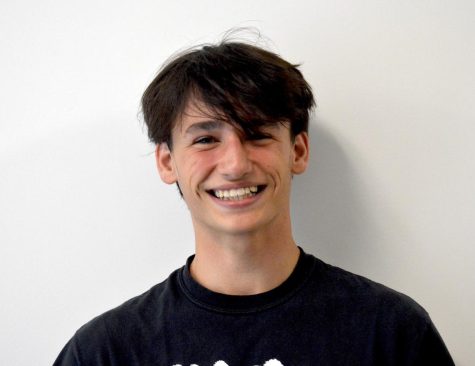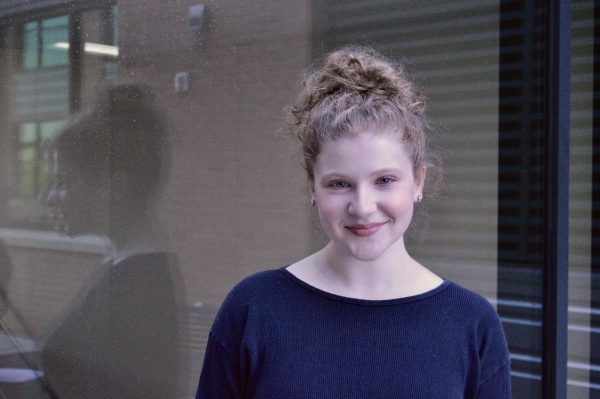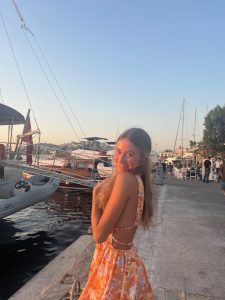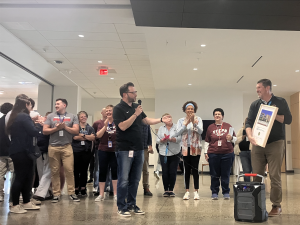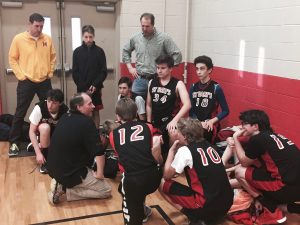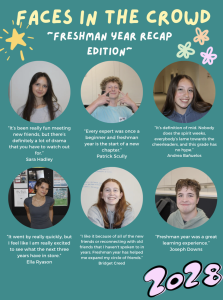Holocaust survivor visits Meridian
May 8, 2023
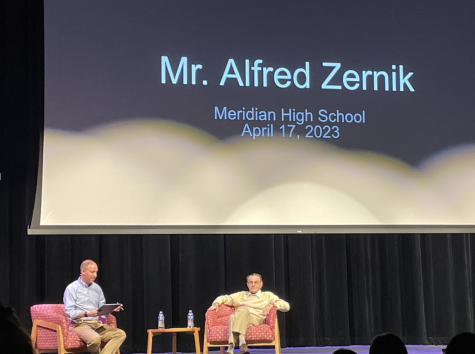
On Monday, Apr. 17, Mr. Alfred Zernik, the father of teacher Dr. Zernik, shared his experiences as a Holocaust survivor and immigrant to Meridian’s students and staff.
Mr. Zernik was born into a German-Jewish family on Aug. 2, 1932, in Berlin, Germany. His parents were established businesspeople during his early years and his father served on the Russian and French fronts in World War I.
While he lived a comfortable life in Berlin for most of his childhood, all that changed on Nov. 10th, 1938. A state-organized mob attack on German-Jewish homes, synagogues, and business, now commonly referred to as Kristallnacht (“night of broken glass,”) had destroyed much of Berlin. At the age of just six years old, Mr. Zernik was sent home from his public school indefinitely.
His family departed from Germany a year later in 1939, traveling to France and Italy before eventually finding themselves in the United States before the start of World War II on Sep. 1, 1939. The Zerniks settled in Pennsylvania’s largest city, Philadelphia, where Mr. Zernik continued his schooling.
Mr. Zernik initially struggled with his identity upon moving to the United States, but he learned he was just as American as any of his peers were.
“I’m not [a] Jewish person who is American. I’m an American who is of the Jewish religion,” Mr. Zernik said. “We are Americans first.”
Mr. Zernik was invited to speak to the student body by his daughter, Dr. Zernik, an English teacher at Meridian.
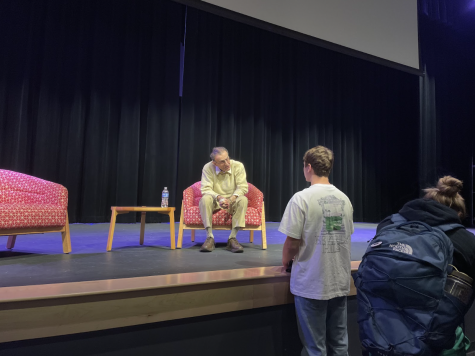
“[This chat] was very important for me with the large Jewish population that [Meridian] has, both staff members as well as students,” Dr. Zernik said. “I thought it was time, and with Falls Church City’s belief in equity, I wanted people to actually hear from someone with firsthand experience.”
Dr. Zernik explained that though her father was originally reluctant to come to Meridian, the increased acts of antisemitism at Meridian and throughout the nation as a whole helped him change his mind.
“I think my father is realizing as he is getting older that his voice is pretty critical,” Dr. Zernik said. “I don’t think I have to tell you with the amount of antisemitism and the rise in the number of Holocaust deniers [how important his voice is].”
Dr. Zernik recounted her first time understanding the pain and suffering that her father and millions of other Jewish people faced.
“I went to the Yad Vashem, Israel’s equivalent of the Holocaust Museum, and I suddenly understood my father and what he went through. I had not really understood it before, but it all became clear to me. Ever since then, Judaism has become even more important in my world,” Dr. Zernik said.
Both Dr. Zernik and her father demonstrated strong appreciation for the recently-formed and student-led Judaism At Meridian club, which has led to a tremendous surge in Jewish action across the school.
“[Judaism At Meridian] is something that I hope [Meridian] will continue because I think it is very important,” Dr. Zernik said. “I love seeing how many Jewish students there are in this school, and I want that to continue because being in a public school can sometimes be an isolating place.”
The Holocaust is a crucial piece of history that students should never forget.
“I think that these young people should know man’s inhumanity against man should not be repeated,” Mr. Zernik said. “You are young, you are America’s pride and joy. You are the future leaders and you will lead this country in some capacity, one way or another. And you remember that I came to speak to you,” he concluded.
Mr. Zernik finished his conversation with a memorable quote:
“It is very important for us to always remember.”



